Eighteenth Century
Jean-Jacques Lequeu, Visionary Architect
Lots of bizarre stuff from this creator, seen at this page, and also here.And if you're in New York City over the next couple of months, you can visit an exhibit.

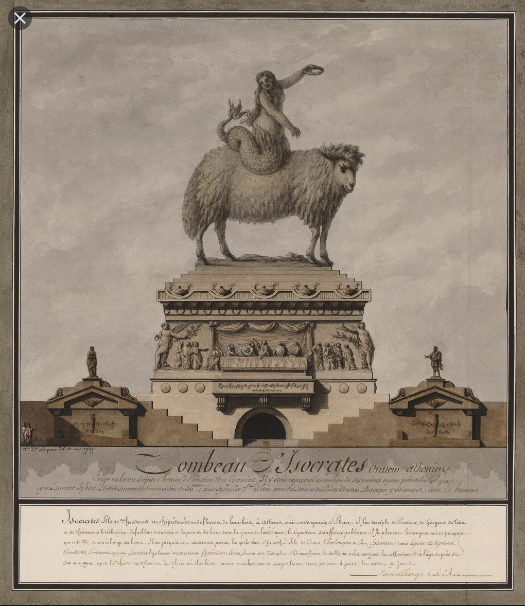
Posted By: Paul - Wed Feb 05, 2020 -
Comments (3)
Category: Architecture, Art, Eccentrics, Eighteenth Century, Nineteenth Century
The Solitude Experiment of Mr. Powyss
Circa 1793, a Mr. Powyss of Lancashire apparently decided to conduct an unusual psychological experiment by paying a man to live in his basement, in complete solitude, for seven years.Information about this experiment is hard to find. A brief news item appeared about it in 1797:

The Annual Register... for the year 1797
A news story 30 years later reported that the subject of the experiment had emerged after seven years apparently no worse for wear. Or, at least, he had "absolutely accomplished it":
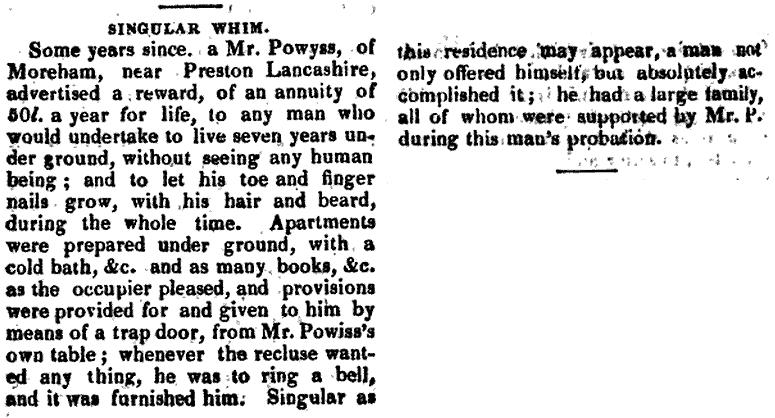
Given the lack of info, I suspect that the entire story might be an urban legend — one of those fake news stories that often made their way into early magazines and newspapers. However, the story has inspired author Alix Nathan to use fiction to fill in the blanks... imagining what might have happened in her recent novel The Warlow Experiment. As reported by the Guardian:

Posted By: Alex - Fri Jul 19, 2019 -
Comments (3)
Category: Experiments, Psychology, Eighteenth Century
Mystery Gadget 77

Maybe an ocarina?
The answer is here.
And after the jump.
More in extended >>
Posted By: Paul - Mon Jun 17, 2019 -
Comments (4)
Category: Eighteenth Century, Nineteenth Century
Raising a Perfect Wife From Scratch
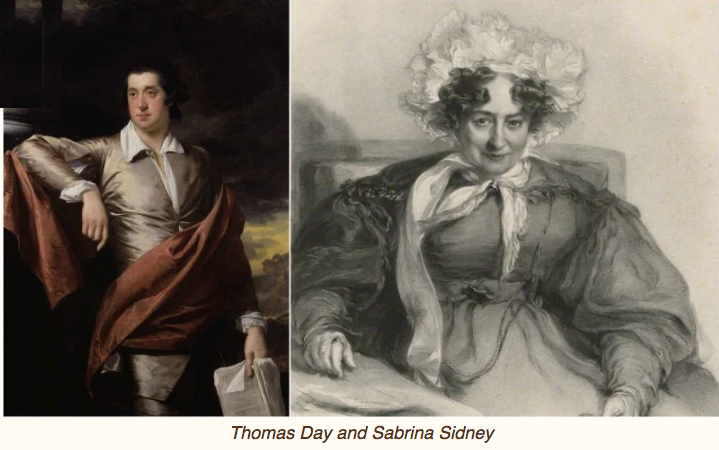
Sabrina Sidney, was a British foundling girl taken in when she was 12 by author Thomas Day, who wanted to mould her into his perfect wife. Day had been struggling to find a wife who would share his ideology and had been rejected by several women. Inspired by Jean-Jacques Rousseau's book Emile, or On Education, he decided to educate two girls without any frivolities, using his own concepts.
In 1769, Day and his barrister friend, John Bicknell, chose Sidney and another girl, Lucretia, from orphanages, and falsely declared they would be indentured to Day's friend Richard Lovell Edgeworth. Day took the girls to France to begin Rousseau's methods of education in isolation. After a short time, he returned to Lichfield with only Sidney, having deemed Lucretia inappropriate for his experiment. He used unusual, eccentric, and sometimes cruel, techniques to try to increase her fortitude, such as firing blanks at her skirts, dripping hot wax on her arms, and having her wade into a lake fully dressed to test her resilience to cold water.
The full story here.
Posted By: Paul - Tue May 07, 2019 -
Comments (0)
Category: Eccentrics, Education, Husbands, Wives, Eighteenth Century, Nineteenth Century, Love & Romance
The Mecklenburg Declaration of Independence
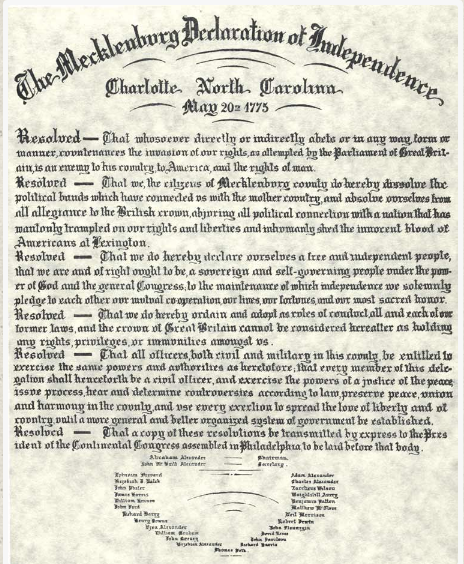
An honest mistaken memory, or a deliberate hoax to cash in on the early glamour of the American Revolution? You decide!
The Wikipedia page.
History Channel account.
The Mecklenburg Declaration of Independence is a text published in 1819 with the claim that it was the first declaration of independence made in the Thirteen Colonies during the American Revolution. It was supposedly signed on May 20, 1775, in Charlotte, North Carolina, by a committee of citizens of Mecklenburg County, who declared independence from Great Britain after hearing of the battle of Lexington. If the story is true, the Mecklenburg Declaration preceded the United States Declaration of Independence by more than a year. The authenticity of the Mecklenburg Declaration has been disputed since it was published, forty-four years after it was reputedly written. There is no verifiable evidence to confirm the original document's existence and no reference to it has been found in extant newspapers from 1775.[citation needed]
Professional historians have maintained that the Mecklenburg Declaration of Independence is an inaccurate rendering of an authentic document known as the Mecklenburg Resolves. The Mecklenburg Resolves were a set of radical resolutions passed on May 31, 1775, that fell short of an actual declaration of independence. Although published in newspapers in 1775, the text of the Mecklenburg Resolves was lost after the American Revolution and not rediscovered until 1838. Historians believe that the Mecklenburg Declaration was written in 1800 in an attempt to recreate the Mecklenburg Resolves from memory. According to this theory, the author of the Mecklenburg Declaration mistakenly believed that the Resolves had been a declaration of independence, and so he recreated the Resolves with language borrowed from the United States Declaration of Independence. Defenders of the Mecklenburg Declaration have argued that both the Mecklenburg Declaration and the Mecklenburg Resolves are authentic.
Posted By: Paul - Sat Jan 12, 2019 -
Comments (0)
Category: Antiques, Anachronisms and Throwbacks, Confusion, Misunderstanding, and Incomprehension, Government, Hoaxes and Imposters and Imitators, Politics, Eighteenth Century, Nineteenth Century
Why a Monkey on the Leinster Coat of Arms?

"The coat of arms of the Dukes of Leinster derives from the legend that John FitzGerald, 1st Earl of Kildare, as a baby in Woodstock Castle, was trapped in a fire when a pet monkey rescued him. The FitzGeralds then adopted a monkey as their crest (and later supporters) and occasionally use the additional motto Non immemor beneficii (Not forgetful of a helping hand)."
The Wikipedia page.

Article source.
Posted By: Paul - Thu Jul 19, 2018 -
Comments (1)
Category: Animals, Royalty, Eighteenth Century
Who Was That Masked Lady Composer?

Mlle Duval was an 18th-century female composer whose birth and death dates are unknown, whose first name and backstory are unknown, and yet who had a fairly prominent public career. This is one of those historical incidents that I fancifully attribute to some time traveler having fun.
Her Wikipedia page.
Entry in The Norton/Grove Dictionary of Women Composers.
I can't find any recordings for her online, but she appears on the CD at the link.
Posted By: Paul - Thu Oct 05, 2017 -
Comments (5)
Category: Music, Unexplained Historical Enigmas, Women, Eighteenth Century
Blackguardiana
You can surely amuse yourself for hours reading this 1793 guide to rogues. And I think we should resurrect these old terms for modern times. For instance, if a woman is inconveniently pregnant, let us say she has "sprained her ankle."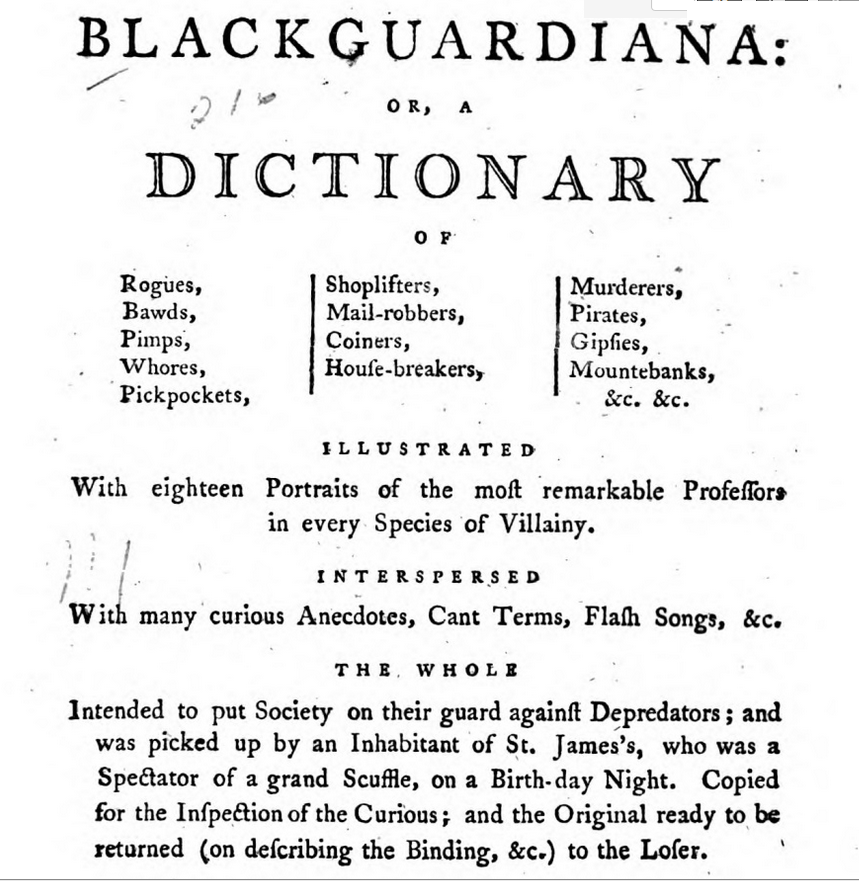

Posted By: Paul - Sat Feb 18, 2017 -
Comments (3)
Category: Crime, Eighteenth Century, Slang
The Lake Superior Mermaid
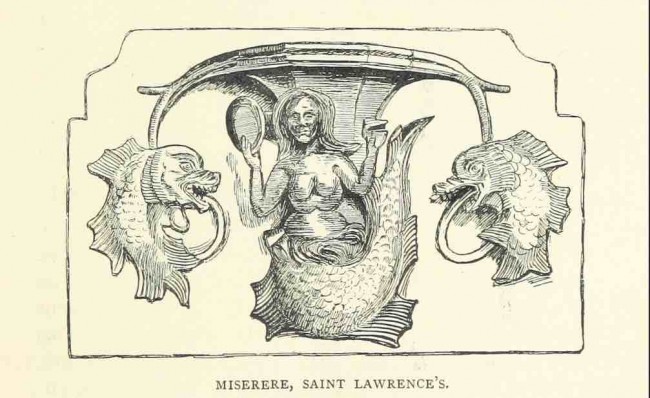



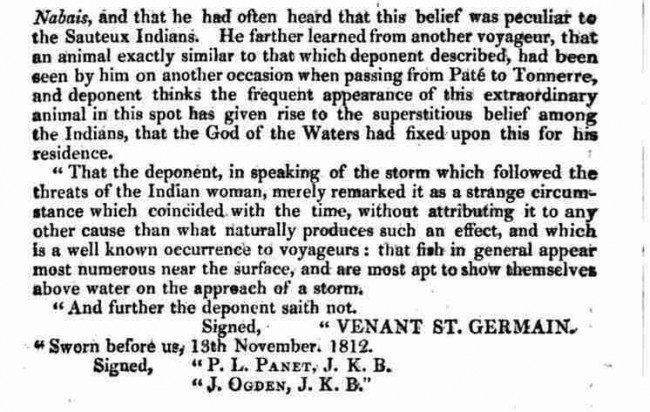
Original text here.
Posted By: Paul - Sun Feb 12, 2017 -
Comments (1)
Category: Cryptozoology, North America, Eighteenth Century
Jemima Wilkinson Is Lord

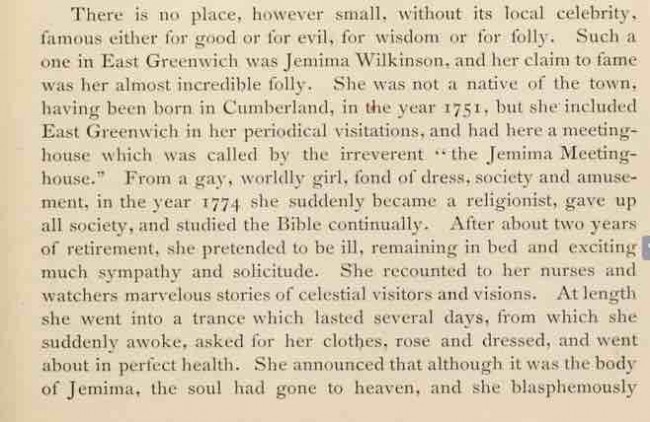
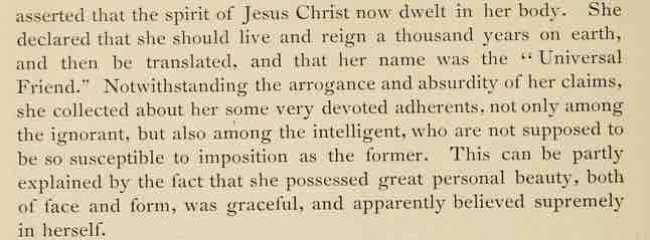
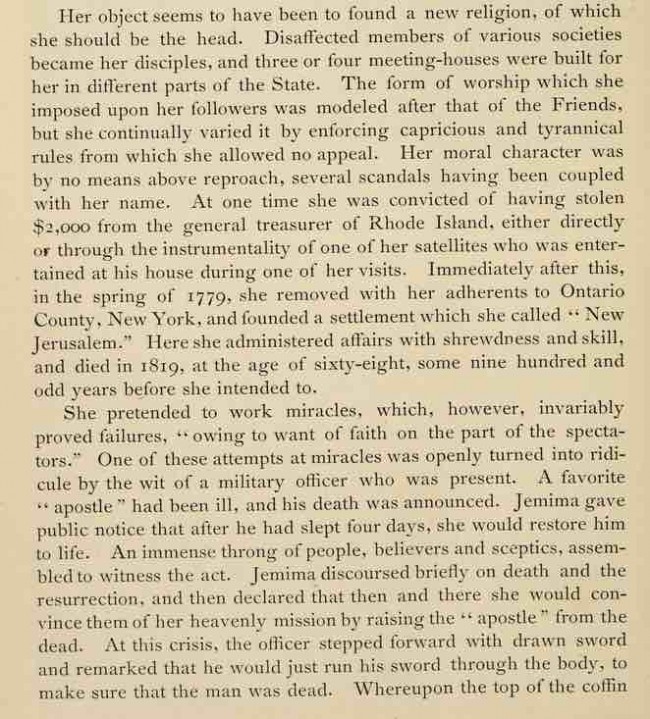

The source.
Posted By: Paul - Sat Jan 28, 2017 -
Comments (2)
Category: Delusions, Fantasies and Other Tricks of the Imagination, Eccentrics, Hoaxes and Imposters and Imitators, Religion, Rituals and Superstitions, Scams, Cons, Rip-offs, and General Larceny, Eighteenth Century

| Who We Are |
|---|
| Alex Boese Alex is the creator and curator of the Museum of Hoaxes. He's also the author of various weird, non-fiction, science-themed books such as Elephants on Acid and Psychedelic Apes. Paul Di Filippo Paul has been paid to put weird ideas into fictional form for over thirty years, in his career as a noted science fiction writer. He has recently begun blogging on many curious topics with three fellow writers at The Inferior 4+1. Contact Us |




